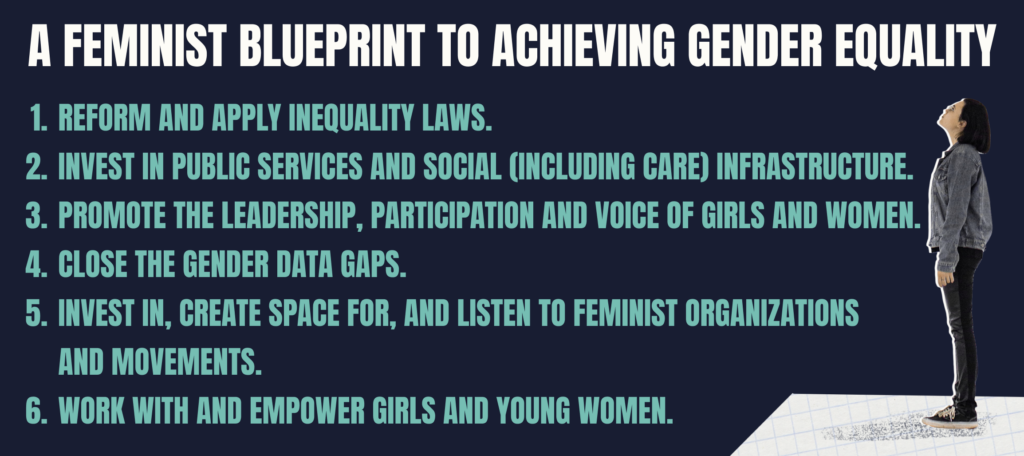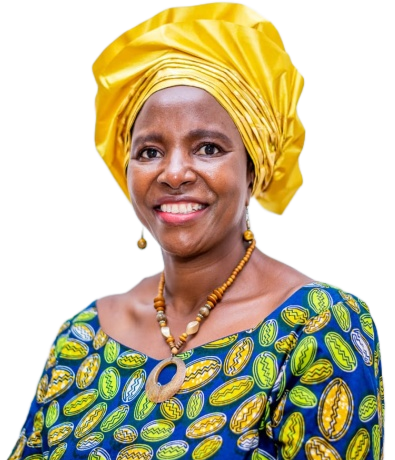No G7 country made fast progress on gender equality in recent years. Here’s how experts think they should flip the script!
While there has been hard-fought advocacy wins to raise gender equality up the G7 policymaking agenda, it is clear that G7 countries are not ready to really address the root causes of gender equality either at home or abroad.
Depending on which G7 sub-group you follow, there are both promising and concerning signs about how this powerful group of countries conceives of gender equality challenges. On the more positive side, the G7 “Senior Development Officials” recognized at their recent meeting that gender equality plays a “central role in achieving the SDGs”, that there have been “rollback(s) of women’s and girls’ rights due to the pandemic and other crises” and that “gender equality requires fair distribution of financial resources.” Important barriers to equality – like the unequal care burden borne by girls and women – are at least being recognized in G7 discussions in ways they haven’t been in the past.
The G7 Foreign Ministers focused heavily on concerns about women in non-G7 countries including Afghanistan, Yemen, and Iran. However, commentary on the ongoing gender gaps within G7 countries themselves are less discussed; even though no G7 country made fast progress on gender equality in recent years, and three (the UK, Germany and Japan) made no progress at all. There is clearly more work to do “at home” on gender equality across the G7 countries.
If G7 countries lack the framework needed to take the systematic action needed to address gender equality both at home and abroad, thankfully the EM2030 Blueprint for Change can guide them! We weighed in with our friends from the W7 Advisory Group, who shared their perspective on the most important recommendations G7 countries should be taking up to drive real change for women and girls around the world.

Here’s what W7 Advisers had to say:
Kristy Kade – CEO, White Ribbon Alliance
3. Promote the leadership, participation, and voice of girls and women.

Many women are never asked to inform the decisions made about their bodies, health, or minds, let alone the larger world. But they are the foremost experts and sources regarding their own lives, experiences, and circumstances. They know best what is needed to improve them, and their voices should drive change agendas. Biases and beliefs about women’s knowledge and capabilities run deep. So deep that many of us who want to make things better for women, attempt—both unconsciously and not—to do so with little or no direct involvement from the everyday women impacted by our actions. This is the repeated missing ingredient, the routine diagnosis for failed policies and programs—solutions created and implemented in the absence of women’s voices.
Esther Mwaura-Muiru – Global Advocacy Director, Stand for Her Land Campaign, a global initiative hosted by Landesa
3. Promote the leadership, participation and voice of girls and women
The participation of girls and women in public life is not only a core human right but it is also essential for countries’ social and economic health. Yet gender norms about leadership, as well as poverty, care burdens and violence against female public figures often exclude women and girls from decision-making spaces.
A study in India finds that the presence of female leaders in village councils influenced girls’ aspirations, parents’ expectations for their daughters, and how long girls stayed in school. The visibility of women in public office also shifts people’s perceptions about leadership – a step towards ending the gender norms that hold girls and women back.

Yamina Ouldali – Senior Communications and Policy Officer, Gender and Development Network (GADN)
2. Invest in public services and social (including care) infrastructure
As shown time and time again by multiple, intersecting crises, women and girls bear the brunt of unpaid care work and have to step in where states and public services are failing. If we are to genuinely work towards a more gender-equal world, resisting austerity, and instead, implementing progressive national and international tax regimes is vital for the provision of gender-transformative public services. This must include combating illicit financial flows, tax avoidance and havens, introducing wealth taxes for the super-rich and windfall taxes for corporations as well as establishing a UN intergovernmental tax body and implementing a UN Tax Convention in line with UNGA resolution 77/244.

Beth Woroniuk – Policy Lead, Equality Fund
5. Invest in, create space for, and listen to feminist organizations and movements
Many of the most important changes of the last hundred years have been powered by feminist movements. Women’s organizations have pushed for democratic change, built peace, organized economic alternatives, and brought key issues like reproductive rights into legislatures, community halls, and coffee shops. Yet, they continue to receive pennies out of philanthropic and official development assistance dollars. They are all too often excluded from key discussions. Take, for example, Afghan women’s organizations and global talks on the future of Afghanistan.
This is something G7 leaders can address. Invest in, involve, and listen to feminist movements. And act on what they say.

Dr. Roopa Dhatt – WGH Executive Director and Co-Founder
2. Invest in public services and social (including care) infrastructure?

Currently women make up 70% of the overall health workforce, and 90% of frontline staff worldwide, but occupy just 25% of leadership positions. Supporting women while investing in the health workforce leads to a triple dividend: First, a health dividend, by helping to develop a more effective and responsive workforce to meet growing health care demands and demographic changes. Second, a gender equality dividend: women will gain income, education and autonomy, leading to improvements in education, health, and other aspects of development. Third, an economic dividend: new jobs will be created, fueling economic growth.
Sohini Bhattacharya, CEO, Breakthrough
3. Promote the leadership, participation and voice of girls and women

I would like to comment on the recommendation number 3 : Promote the leadership, participation and voice of girls and women. Women’s leadership actually makes structural changes and brings in cultural diversity in every space they occupy. Feminist leadership is key to achieving gender equality and not to mention enhanced and profitable economic activity. However, the truth is that the vulnerable girl from a poor economy doesn’t need to reach her full potential because it will improve her country’s economy, she needs to do so because it is her right. As we see more and more women take ownership, raise their voice and realise their rights, we will begin to transform existing systems of discrimination and power.
Foteini Papagioti – Senior Global Policy Advisor, ICRW
3. Promote the leadership, participation and voice of girls and women?

Promoting gender equality is a fundamental human right that can also have important benefits for societies:
- Gender equality is a better predictor of peace than a country’s GDP or level of democracy;
- addressing the lack of economic parity between men and women could add $12 trillion to global growth;
- women’s leadership has been associated with more diverse legislative agendas and lower levels of corruption
- Women’s political empowerment is associated with a decrease in a country’s carbon emissions. Parliaments with a greater proportion of female members have a higher ratification rate of environmental treaties, and corporate boards with more women disclose more carbon emissions information.
Stephanie Siddall, Director of Global Policy and Advocacy, Women for Women International.
3. Promote the leadership, participation and voice of girls and women
4. Invest in, create space for, and listen to feminist organisations and movements

All G7 nations are miles off target for meeting the existing commitments they have made to achieve gender equality, including as part of the 2030 Agenda. But, we have a ready-made solution for speeding up implementation – promote the leadership, participation and voice of women and girls and invest in, create space for, and listen to feminist organisations and movements. They should be recognised as strategic partners for creating a more gender equal world.
We believe this is the only viable pathway for G7 leaders to achieve their goals across a broad range of areas. But it can only be done through sustained, regular interactions through which there are clear benefits for those involved such as learning exchanges and access to resources – including funding that is long-term, flexible and accessible. This approach is fundamental for supporting women, feminist organisations and movements to accelerate the change they are already driving forward.
Fumie Saito – W7Japan Co-Chair/ Director, Global Advocacy, JOICFP
1. Reform and apply inequality laws
G7 leaders should take up the first recommendation, “Reform and apply inequality laws.” The G7 leaders repeatedly stress the promotion of ‘rule of law’ in the international order. The “rule of law” principle should also be pursued in relation to gender equality. It does not cost much money to reform and apply the laws. We just need strong political will by the G7 leaders.
I also strongly support recommendation No.6. Nurturing youth leadership is one of the goals of this year’s W7. We expect youth to not just participate, but to lead the feminist movements domestically and globally.

Pat Black – International Advisor, Soroptimist International
3. Promote the leadership, participation and voice of girls and women?

Many Governments, including those of G7 (and G20) countries, have made commitments in previous years through international Treaties, Resolutions and Agreements to developing a gender equality legislative framework within their countries. This has been done in the knowledge that supporting women to take their equal place as leaders in their communities in partnership with men enhances the economic, social and governance standards in those communities and countries. The data collected through many sources is showing a widening gender gap especially for women in marginalised communities.
Many of those commitments have yet to be implemented.
Action is needed now.
Prof. Pam Rajput – Professor Emeritus , Panjab University
1. Reform and apply inequality laws

All the six recommendations of EM2030 Blueprint to governments are interlinked and critical for a gender equal and just world. However, the first recommendation, that is : Reform and Apply Equality Laws is key to that vision and achieving the transformative agenda, which got derailed during Covid. All the countries including the G7 consciously agreed to gender as cross-cutting to all the SDGs, in addition to the stand alone goal on Gender Equality and Empowerment of Women (SDG5). There is enough evidence in each country to show how Covid disproportionately impacted the lives of women and exacerbated the inequalities. This has had adverse impact on the socio-economic lives of most of the population of the world and derailing, as mentioned earlier, the economic growth and development. This has indeed put in jeopardy the realisation of transformation agenda by 2030. For this very reason the G 7 countries are likely to take on board recommendations one, which is only restating their commitment and now acting for a holistic development and gender just, peaceful and liveable planet.
Recognition and understanding of the crucial role gender equality plays in securing a just and sustainable future is becoming more apparent among the G7. Leaders are doing more to “recognize the importance of advancing gender-responsive climate action, closing the digital gender gap, strengthening and formalizing the care economy, and breaking down gender barriers in education.” Yet they continue to skirt around innovative and transformative ideas such as the promotion of key systems-wide solutions like fairer global tax rules, investments in social protection and well-resourced public services.
Instead we hear the same calls for solutions like “private finance” to deal with “financing gaps” in ways that haven’t changed for decades despite economic inequality widening, austerity deepening, and progress on gender equality stagnating in these very same decades.
We have seen the recommendations outlined above accelerate progress on gender equality and the sustainable development goals, what we need from G7 leaders is commitment!
With enormous thanks to the W7 Advisers, who contributed their time and deep expertise to these joint articles. And to the entire W7 Japan team for convening a participatory and collaborative process to influence the G7 on key gender equality issues at such a pivotal time, with just 7 years left to reach the SDGs.



